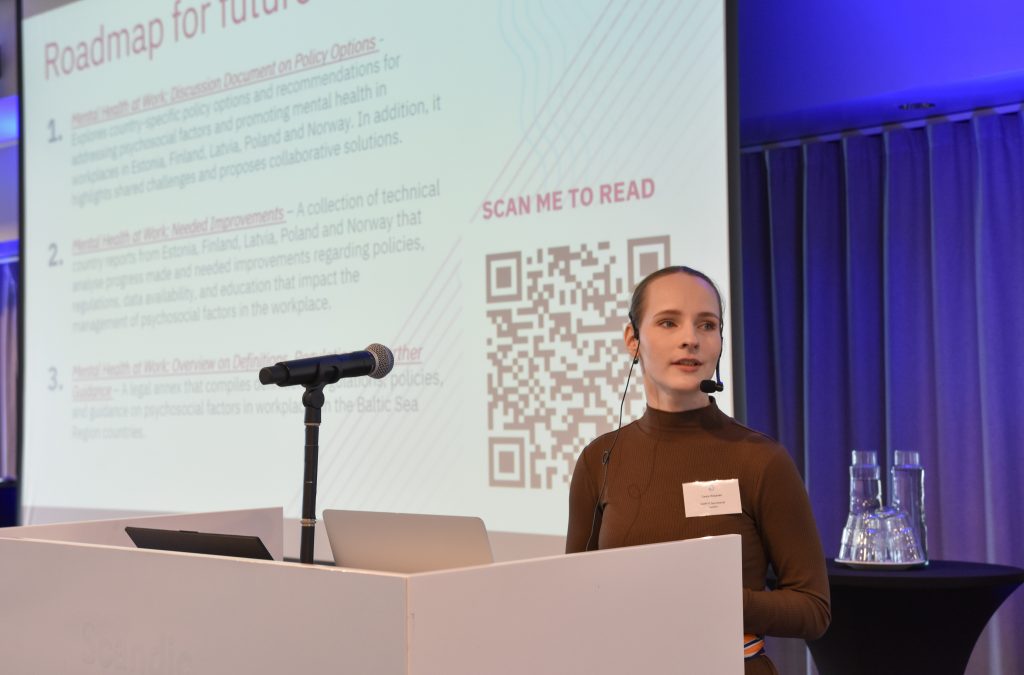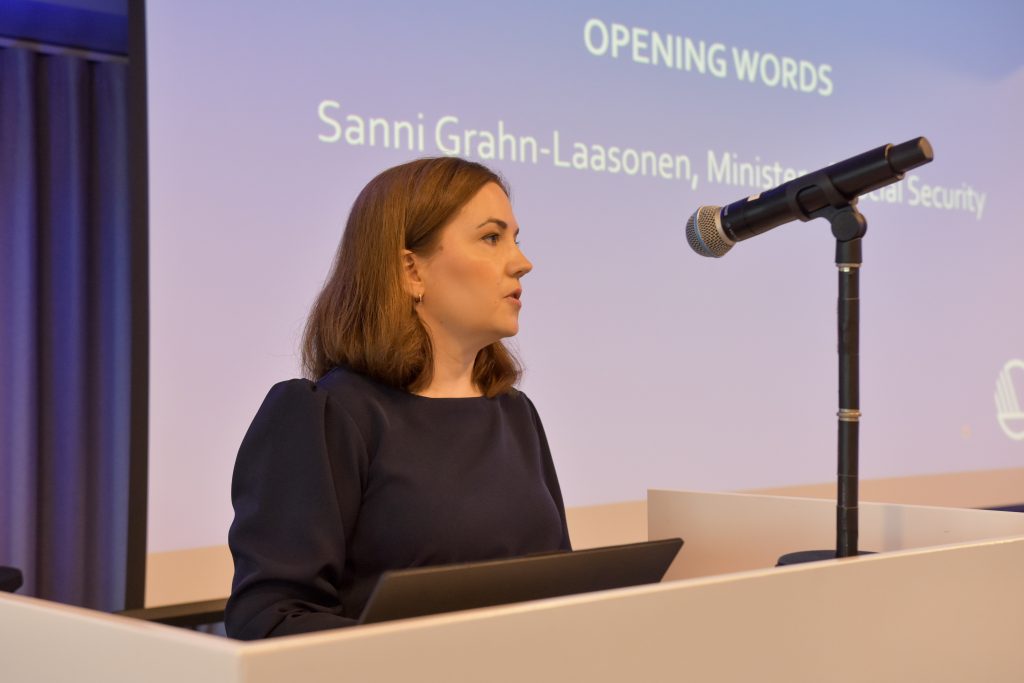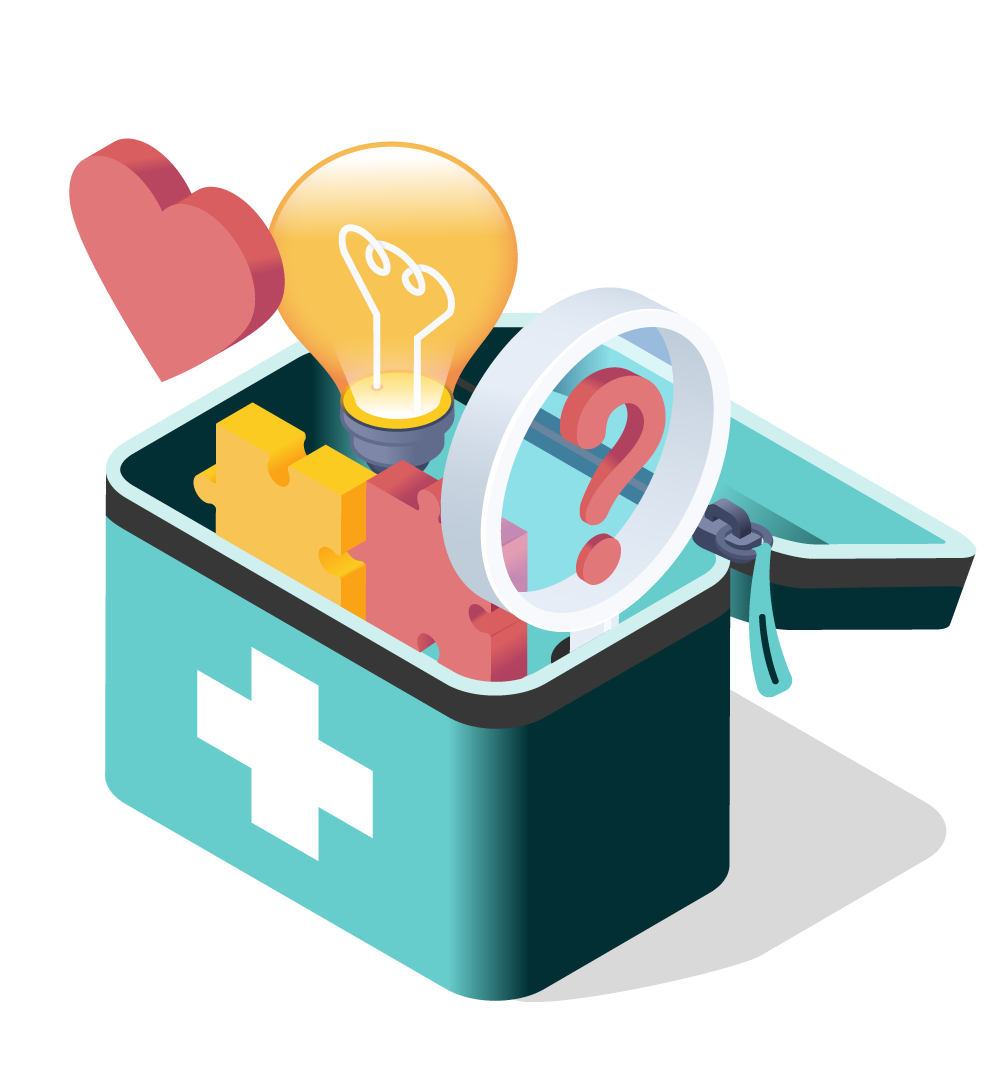“Our mental health is often the elephant in the room when we talk about how we are doing at work,” says Saara Rissanen, project manager for MentalHealthMatters.
The MentalHealthMatters project
Proposes measures for managing psychosocial risks in the workplace.
Led by the Secretariat of the Northern Dimension Partnership in Public Health and Social Well-being (NDPHS).
Participating countries: Estonia, Finland, Latvia, Norway and Poland.
Co-financed by the EU with funding from Interreg Baltic Sea Region.
Project duration: August 2023 – July 2025.
We are usually good at discussing what works well – and less well – in the physical work environment. But it tends to be far more challenging to talk about the psychosocial work environment.
Read this article i Norwegian on our Arbeidsliv i Norden.
Current health and safety legislation, standards and training mainly focus on physical hazards and accident prevention, while giving little attention to psychosocial risk assessment, health promotion and preventive measures.

The MentalHealthMatters project wants to change that.
To put it simply: They want to fill the first aid kit with more than just plasters and bandages.
Could help reduce sickness absence
Employees’ mental health is a growing concern for employers. And while numbers do not tell the whole story, these figures underline the scale of the problem:
- Half of EU employees believe they are exposed to stress at work, which in turn accounts for around half of all sickness absence.
- One in six employees in Europe has been absent from work due to mental health challenges.
Despite surveys, research reports and numerous initiatives, there is still no quick fix for tackling this growing issue.
Nordic conference on the psychosocial work environment
Conference on the Psychosocial Working Environment – Effective Approaches to Improve the Psychosocial Work Environment and Enhance Employees’ Well-Being
Held in Helsinki on 11 September
Around 100 participants
Organised by NIVA Education on behalf of the Finnish Presidency of the Nordic Council of Ministers
MentalHealthMatters was one of several projects presented at the conference

According to Rissanen, the project shows that what is often missing is systematic work to look at how different workplace factors affect employees’ mental health.
“There is room for improvement,” she says.
Different approaches
The project shows that we do not necessarily talk about the same thing when we talk about the psychosocial work environment. We may use the same words, but interpret their meaning differently.
The MentalHealthMatters project has gathered definitions, laws, and regulations regarding psychosocial factors in the workplace, as well as the different countries’ strategies and policies.
Here is a summary of similarities and differences between Finland, Sweden and Norway:
Definitions
Similarity: None of the three countries has a single, clear legal definition of “psychosocial risk,” but all regulate the issue indirectly using various terms.
Difference: Finland emphasises “workload factors,” Sweden “organisational and social conditions,” while Norway focuses on protection against harmful behaviour and harassment.
Legislation
Similarity: All three countries impose a strong legal duty on employers to prevent psychosocial work environment problems.
Difference: Finland and Sweden have specific regulations addressing psychosocial factors, while Norway primarily regulates through general occupational health and safety requirements and specific provisions on harassment, violence and threats.
Policies and Strategies
Finland: National Mental Health and Suicide Prevention Strategy (2020 –2030), plus the “Policy for Work Environment and Wellbeing at Work until 2030.”
Sweden: National Mental Health and Suicide Prevention Strategy (2024/25), plus work environment strategies for 2021 – 2025 and 2025 – 2030.
Norway: The Inclusive Working Life Agreement (IA Agreement) and the “Work Environment Programme,” involving the Labour Inspection Authority, STAMI, the Petroleum Safety Authority and others, focusing on reducing sickness absence and improving prevention.
A handy toolkit
As part of the project, a practical toolkit has been developed for employers, managers, HR staff and health and safety representatives in small and medium-sized businesses and organisations.
The mental health first aid kit is a free online tool developed by workplace safety and health experts.
By exploring the kit, users will find support for a wide range of workplace challenges. The digital tools are grouped into categories such as working time arrangements, job demands, job control and insecurity, remote work, work – life balance, leadership, workplace conflict, workplace community, work-related health problems and mental health support.
The kit is available in several languages, including Norwegian and Finnish.
Roadmap for the future
After reviewing current policies and practices, the project proposes measures that could improve occupational health and safety (OHS) systems and enabling OHS professionals to better address existing and emerging psychosocial risks.
The MentalHealthMatters Roadmap Report also provides tailored recommendations for each participating country, including Finland and Norway. The report stresses the need for better knowledge and more systematic management of psychosocial factors for both countries.
General recommendations (for all participating countries):
- Treat the psychosocial work environment as seriously as physical health – integrate it into OHS work and national work environment strategies.
- Strengthen the knowledge base – more research, data and evaluation of initiatives to support evidence-based policy.
- Improve training – build competence among managers, safety representatives, trade unions and OHS professionals to help them identify and address psychosocial factors.
- Encourage tripartite cooperation and transnational networks to share experiences and tools.
- Promote the use of simple, research-based aids to help organisations work systematically on improving the work environment.





